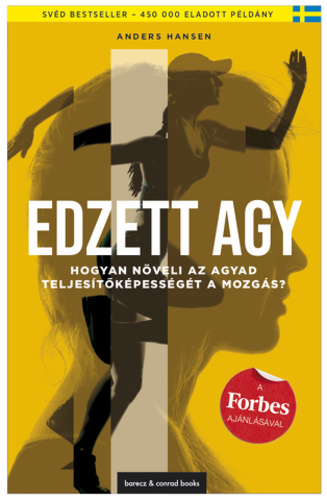
Keywords
neuroplasticity
conscious lifestyle
neurogenesis
How to Cite
Abstract
Lifelong learning is an integral part of the Hungarian education strategy in line with EU guidelines. In line with the maintenance of learning abilities, the school movement culture in the form of everyday physical education has also entered the Hungarian education system. The latter has been proven to have a distinctly beneficial effect on learning processes by a number of researches and studies. Anders Hansen’s book presents and explains the effects of everyday movement on the brain through practical examples. These simple exercises and daily habits can be done at all ages without the need of tools. And their effects are interpreted in plain language by the author, using the latest neuroscientic findings.
Downloads
Similar Articles
- Márton Lontai, Horolma Pamzsav, Dávid Petrétei, Artificial Intelligence in Forensic Sciences Revolution or Invasion? , Academic Journal of Internal Affairs: Vol. 72 No. 4 (2024)
- Valér Dános, Csaba Szabó, „International Cooperation Against Trafficking in Human Beings” , Academic Journal of Internal Affairs: Vol. 70 No. 2 (2022)
- Gergely Dr. Fliegauf, Eszter Dóra Várnai, Criminogenic Risk Factors and the Onset of Suicidal Intentions in Adolescents Engaging in Deliberate Self-Poisoning: Proposed Hypotheses from Psychiatric Consultation Observations. , Academic Journal of Internal Affairs: Vol. 72 No. 8 (2024)
- Zsolt Lippai, Past and present of police non-comissioned officer training , Academic Journal of Internal Affairs: Vol. 70 No. 4 (2022)
- Anna Nemes Nagy, László Ragó, Safeguarding medical care for personnel and prisoners and organisation of health protection during the coronavirus pandemic , Academic Journal of Internal Affairs: Vol. 69 No. 5. ksz. (2021): Különszám
- György László Székely, The different approaches of criminal detection in criminal procedure law and in forensic sciences , Academic Journal of Internal Affairs: Vol. 69 No. 10 (2021)
- Ádám Kalmár, Thoughts about the book “From Military Science to Law Enforcement Science - Social Challenges in the Year of the National Cohesion” , Academic Journal of Internal Affairs: Vol. 69 No. 3. ksz. (2021): Special Issue
- István Kovács, Investigating pimps , Academic Journal of Internal Affairs: Vol. 62 No. 1 (2014)
- Kund Regényi, Nándor Jasenszky, Zsolt Lippai, The concept of security awareness, its development from the point of view of national security, counter-terrorism, and private security , Academic Journal of Internal Affairs: Vol. 70 No. 1. ksz. (2022): Special Issue
- László Bordács, Sándor Rózsa, Improving and observing inmate’s family ties , Academic Journal of Internal Affairs: Vol. 65 No. 11-12 (2017)
You may also start an advanced similarity search for this article.
Most read articles by the same author(s)
- Viktor Németh, Csaba Szabó, The characteristics of mediation according to fields of application , Academic Journal of Internal Affairs: Vol. 69 No. 4. ksz. (2021): Különszám
- Viktor Németh, The History of Regulating Mediation , Academic Journal of Internal Affairs: Vol. 70 No. 12 (2022)
- Viktor Németh, Neuroplasticity , Academic Journal of Internal Affairs: Vol. 69 No. 6. ksz. (2021): Különszám
- Viktor Németh, Critical Thinking , Academic Journal of Internal Affairs: Vol. 70 No. 2. ksz. (2022): Special Issue
- Viktor Németh, The international scientific visibility’s means , Academic Journal of Internal Affairs: Vol. 71 No. 4 (2023)
- Viktor Németh, The History of Regulating Mediation , Academic Journal of Internal Affairs: Vol. 71 No. 1.ksz. (2023): Special Issue
- Szandra Fazekas-Pátyodi, Viktor Németh, „Insisting on quality” , Academic Journal of Internal Affairs: Vol. 71 No. 5 (2023)
- Viktor Németh, How We Decide? ... and how should we decide? , Academic Journal of Internal Affairs: Vol. 70 No. 1 (2022)
- Viktor Németh, Best practices in Hungarian organizational decision-making in the field of integrity management , Academic Journal of Internal Affairs: Vol. 69 No. 3 (2021)
- Viktor Németh, COVID-19 The pandemic that never should have happened, and how to stop the next one , Academic Journal of Internal Affairs: Vol. 68 No. 2. ksz. (2020): Special Issue
